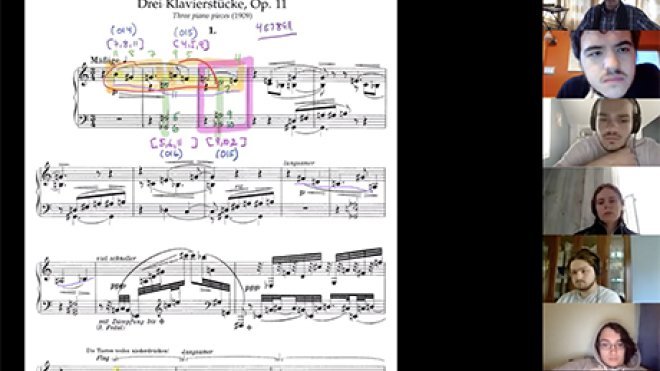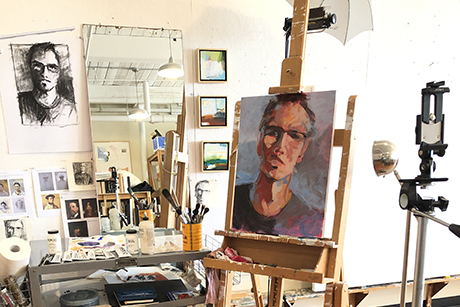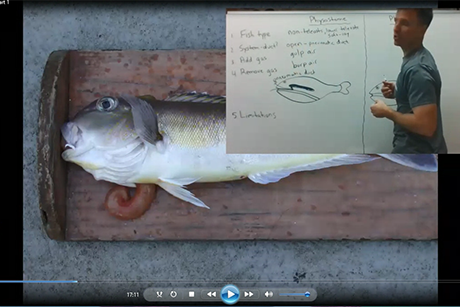Connectivity is Key: Teaching in a Time of Social Distancing
This story is the first in a series highlighting how RWU professors are offering experiential, student-centered approaches to education through innovative distance learning, as classes pivot to online formats for the remainder of the Spring 2020 semester

Michael Rich, professor of art at Roger Williams University, and his students pass the hours chatting as they work on their drawings, reflecting on their art and sharing their thoughts, feelings, and laughter. It’s almost business as usual, with one unprecedented change: Rich is broadcasting his class live over Zoom from his personal art studio in Pawtucket, while each student joins in from their respective homes.
This is teaching and learning within the developing online educational landscape. In response to social distancing measures put in place to lessen the spread of COVID-19, all classes at RWU are being offered online from the end of Spring Break through the remainder of the Spring 2020 semester. Within the span of a few weeks, RWU faculty have risen to the task of shifting the hands-on, experiential learning that shapes the university’s educational approach to entirely remote platforms.

“Connectivity is key right now,” said Rich. “I’m working with the tools I have available and am thinking of the tools the students might have readily available at their fingertips.”
Using online platforms including Bridges, the Google Suite, Instagram, Facebook, Zoom, Slack, and more, professors are finding innovative ways to keep learning interactive and classroom community strong. Sharing best practices with one another and sourcing input from their students, RWU faculty have already developed effective ways of approaching online education.

A 'new normal'
“I generated a poll in Bridges for my students," said David Taylor, professor of biology. "Once they understood that they have ownership of how the class will run and that I really value their opinion, the majority of them said they wanted to maintain some sense of normalcy. I’ve tried to mimic that in my online lectures.”
Taylor is using Zoom to record lectures for his Ichthyology class, which he makes available to students each Friday. In a flipped-classroom design, students watch the lectures as homework and meet through Bridges for synchronous discussions of summary questions.

While they won’t be able to conduct field research as planned, students will watch Taylor give video demonstrations of lab work, and will write papers based on data collected in prior years. To keep morale up, Taylor is finding creative ways of connecting beyond what would have been possible on campus.
“I try to keep it light because that’s my style in general. I do things like put on weird costumes. The other day we had Bring Your Pet to Work Day, so I introduced my cat to the class and I met all their dogs and cats,” Taylor said.
'You have to think of it differently'
Heather Miceli, CORE 101 part-time faculty member, is also making positive student experience a priority. She sees her ultimate job as fostering an appreciation of science in her students, and believes that distance learning is an opportunity for students to dive deeper into constructing their own ideas. Her students are using Google Suites to work collaboratively on the task of creating and updating websites on contemporary issues in science such as climate change, genetically modified organisms, and vaccines.
“A lot of people think it’s not possible to learn asynchronously if they haven’t done it, but you just have to think of it differently. I post discussion questions and students can comment and see what one another are thinking. You can still get that interaction between students. There is still a classroom community, you just have to work harder to develop it,” Miceli said.

This Friday, students in Associate Professor of Music Composition, Theory, and Technology Elliott McKinley’s digital music class will share music they created with one another. Since McKinley’s students don’t currently have access to RWU’s electronic music lab, outfitted with the latest in music software and technology, each student was given a license to the software they needed to complete their assignments on their own computers.
“My first reaction to switching online was I didn’t know how I would make it work for music. Fortunately, we have a lot of technology at our disposal,” said McKinley. “Technology has given me a way to teach music theory and interact with the students in a way that is almost like I’m with them in real time.”
Despite the necessary physical distance, professors across departments are finding silver linings in the cloud. McKinley is using his iPad to collaboratively annotate sheet music with students in ways that would never be possible on the blackboard, and Miceli is using Google Hangouts to check in with students about how they are coping.
“We can still feel connected even with the outbreak. It’s helping the students navigate these times and feel some sense of normalcy,” Rich said.
Faculty: Do you have a story of innovative distance learning at RWU? Email us at stories@rwu.edu